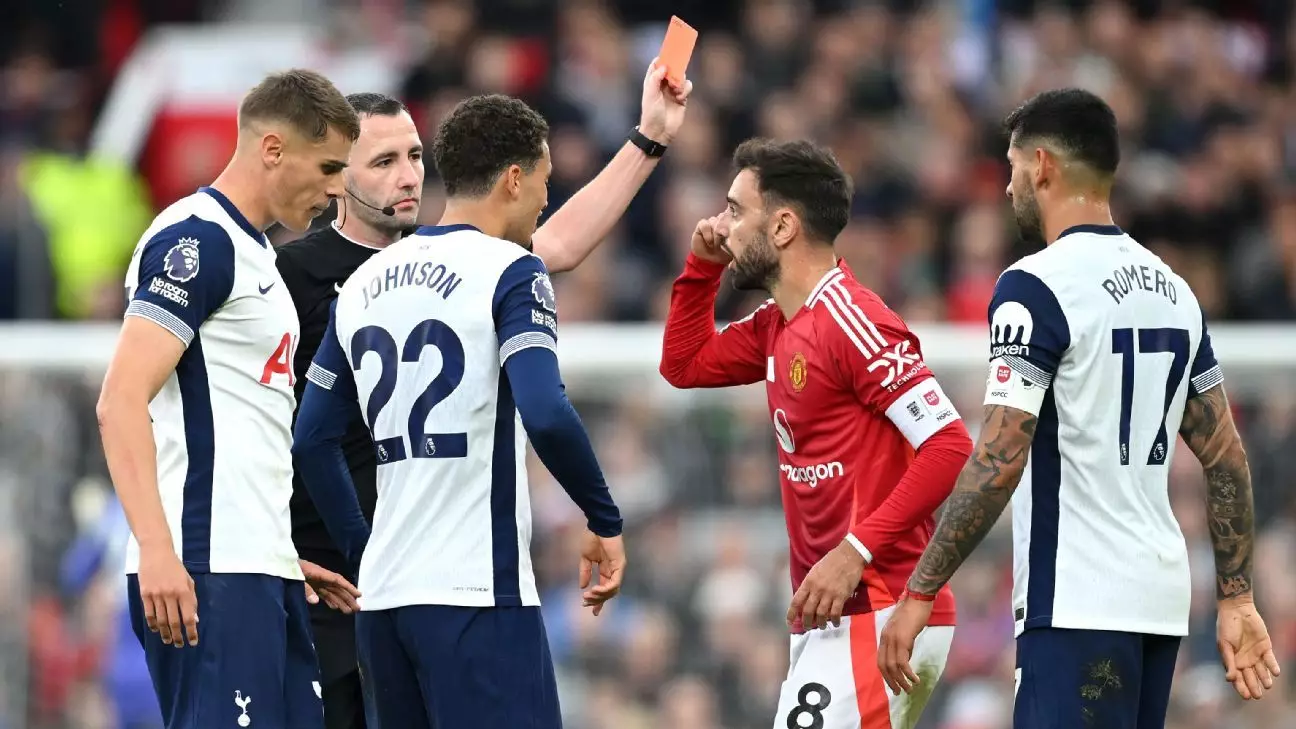In a highly scrutinized incident during a recent match against Tottenham Hotspur, Manchester United’s captain, Bruno Fernandes, found himself at the center of a significant controversy. The situation unfolded in the first half when Fernandes attempted to challenge Spurs midfielder James Maddison. In a split-second decision, referee Chris Kavanagh issued a straight red card, a call that was upheld by VAR official John Brooks. This decision, one that many considered hasty, sparked outrage among United fans and players alike.
The crux of the issue revolves around whether the challenge warranted such severe punishment. Fernandes, in his defense, argued that he had merely slipped, leading to an unfortunate yet unintentional collision. This perspective suggests a broader debate about the consistency and fairness of officiating in the Premier League. Such moments not only impact the immediate game but also cast a long shadow over officiating standards in one of the world’s most scrutinized leagues.
Following the incident, Manchester United’s hierarchy quickly moved to contest the decision, demonstrating their unwavering support for their captain. The appeal was lodged on the following Monday, leading to a swift review process by the Football Association (FA). Their subsequent announcement confirmed the red card’s overturning, allowing Fernandes to play in upcoming fixtures against Aston Villa, Brentford, and West Ham.
The FA’s judgement highlighted the complexities involved in such decisions, showcasing the potential for human error on the field, even with the aid of technology. The rapid overturning of the ban raises questions regarding the initial decision and could serve to embolden arguments for reforming how disciplinary actions are adjudicated in football.
United’s manager, Erik ten Hag, weighed in on the incident, noting that the red card significantly altered the dynamics of the game. While Tottenham was performing strongly, ten Hag pointed out that such moments can swiftly change the course of a match. This commentary opens up a discussion about how officiating decisions can affect team morale and performance, particularly for clubs striving to compete at the highest levels.
Furthermore, Fernandes himself expressed frustration with the officiating standards. He claimed that in his view, and according to Maddison, the incident did not justify a red card. Fernandes’ sentiments echoed a common refrain among players who feel that the stringent application of rules often overshadows the game’s spirit. His comments serve as a reminder that while safety is paramount, the nuances of the game should also be taken into account.
Looking Ahead
As Manchester United prepares for its next matches, the implications of this appeal extend beyond Fernandes’ availability. The episode underscores the importance of player management and the psychological impact of officiating decisions on teams. With critical fixtures on the horizon, United is positioned to leverage Fernandes’ presence on the field to regain momentum in the league.
Ultimately, this situation reflects broader themes in football, including the need for continuous evolution in officiating standards and regulations. As controversies arise and technologies like VAR are integrated, the football community must engage in ongoing discussions about fairness, accountability, and the essence of the beautiful game. The resolution of this particular incident may offer some relief for Manchester United, but it also beckons an earnest dialogue about the game’s integrity moving forward.
